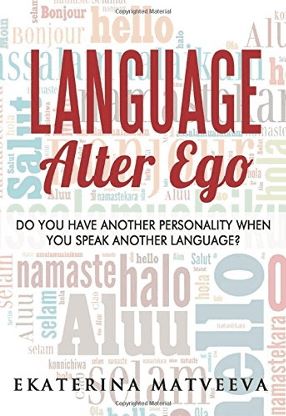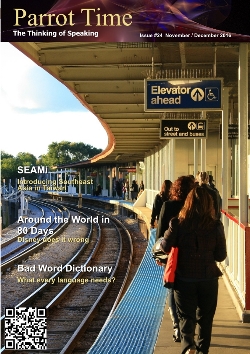|
Language Alter Ego In this issue, I am reviewing the book Language Alter Ego by Ekaterina Matveeva, founder of Amolingua, a community of language tutors from all over the world. Ekaterina is a polyglot and language teacher who speaks 8 languages and has taught them in over a dozen countries. She is also a blogger and TEDx speaker, with one of her main themes being the topic of this book, along with the ways of cultural immersion in language education around the world. If you are a regular reader of Parrot Time, then perhaps you recognize her name from her contribution to the magazine with "Dream, decide, do - tips from a polyglot", in which she provided our readers with her own tips on how to successfully learn a language. In Language Alter Ego, Ekaterina starts by telling us of when she first observed how differently people behaved. When she became involved in theatre, in order to play a character, she had to understand really who they were, and that not everyone thought or acted the same. Each of us has our own views, ways of doing things, and personalities. Another thing she talks about is her recognizing and loathing the teaching methodologies. Not only were the "teachers" often incapable of providing the students with anything of value beyond what they were instructed to present, but that they actually working to strike down any creativity from the students. This would later influence her to develop her own teaching methods and help others. Among language lovers is a popular quote attributed to Charlemagne: "To have another language is to possess a second soul.". This is a poetic way of representing the concept of how language and culture are bound up in one another. The Sapir-Whorf hypothesis, named after linguist Edward Sapir and his student Benjamin Whorf, more scientifically defines this idea as "the structure of a language affects its speakers' world view or cognition". In other words, we see the world according to our language. When Ekaterina discovered a passion and love for languages and culture, she observed that while a person might learn another language, they were not necessarily learning the culture, although the two entities are linked very closely. When this happened, the person was creating their own barrier to understanding and being accepted. She gives several examples, like being superstitious about a number or performing particular daily habits, liking using special shoes around your house. We like to think that when we become "fluent" in a language, we will be mistaken for a native of the country it is spoken in, but this is untrue if we do not match it with our fluency of the culture as well. No one is going to think you are a native Italian if you drink cappuccino at night. So when you embrace both language and culture, you are creating a new version of yourself. You are not just changing your words, you are changing your world view. You learn new ways of doing things as well as attitudes. You might not even notice you are doing it. This is the basic concept of developing a language alter ego, but Ekaterina covers it more eloquently in her book and discusses other topics as well, like respecting traditions, views of time and space related to language, how using another language can change the decisions we make, and much more. Language Alter Ego is wonderfully insightful and both pleasurable and interesting to read. You can find it available on Amazon for purchase and download. You should also watch Ekaterina's TEDx talk on the topic on YouTube. |
| Book Look - Language Alter Ego | ||
| Writer: | Erik Zidowecki | |
All images are Copyright - CC BY-SA (Creative Commons Share Alike) by their respective owners, except for Petey, which is Public Domain (PD) or unless otherwise noted.
|
Looking for learning materials? Find entertaining and educational books for learning a language at Scriveremo Publishing. Just click the link below to find learning books for more than 30 languages!
| |
comments powered by Disqus













































